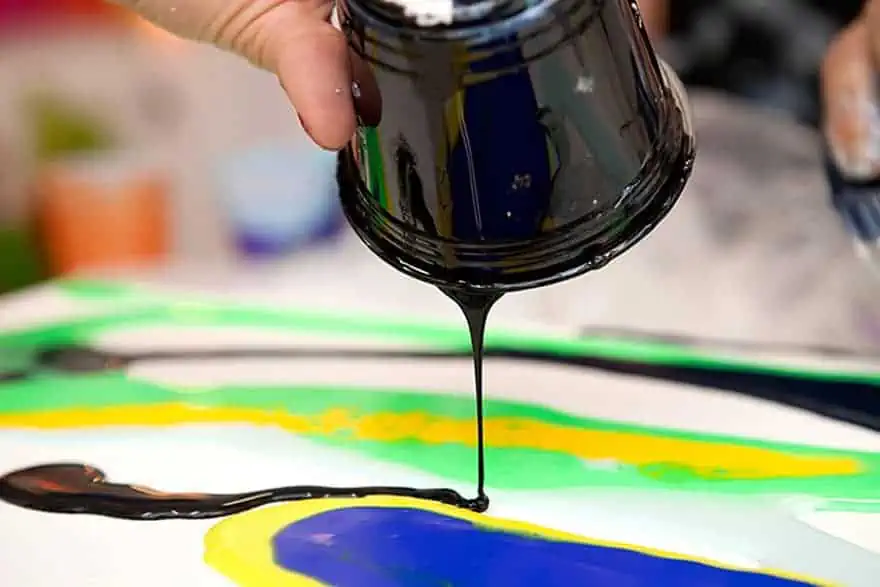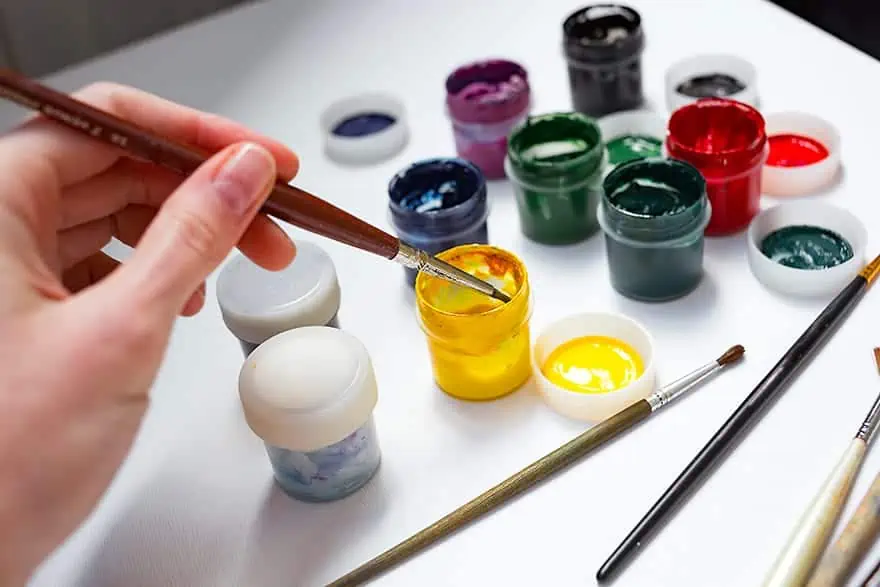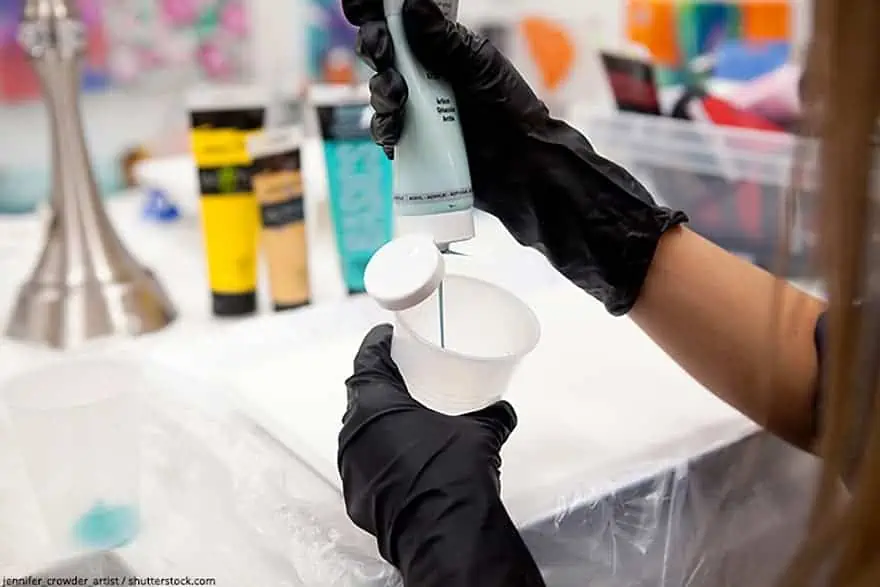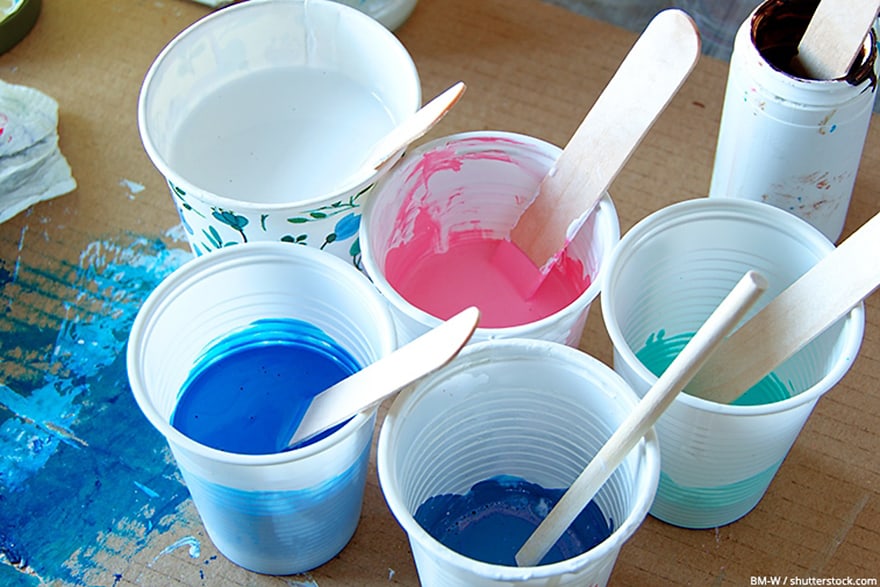How Much Water to Add to Acrylic Paint
This post may contain affiliate links. We may earn a small commission from purchases made through them, at no additional cost to you.
The choice of acrylic painting medium is popular all over the world. This is because thinning acrylic paint is easy and provides variations in color and consistency. This allows artists to create unique effects. You can create the look of a watercolor painting with thinned paint, or even copy the look of an oil painting. All you need to create these effects is to know how to thin acrylic paint correctly to get what you want.
- 1 How to thin Acrylic Paint
- 1.1 What is Acrylic Paint?
- 2 Various Ways of how to Thin out Acrylic Paint
- 2.1 Water as an Acrylic Paint Thinner
- 2.2 Thinning Medium as an Acrylic Paint Thinner
- 2.3 Thinning Acrylic Paint with an Acrylic Binder
- 2.4 Thinning Acrylic Paint with Pouring Medium
- 3 Reviving Acrylic Paint that has Dried
How to thin Acrylic Paint
Acrylic paints can be thinned by adding water, a pouring medium, or using an acrylic binder. To get the correct consistency, you need to take a few things into account. Let us have a look at what acrylic paint is before we move on to discussing the different ways of how to thin out acrylic paint.
What is Acrylic Paint?
One question that often arises is can you dilute acrylic paint with water? The simple answer is yes acrylic paints can be diluted with water.
Some other characteristics of acrylic paint include:
- Dries fast
- Easy to apply
- There is little odor
- Non-flammable
- Does not give off toxic fumes
Acrylic paint is mainly made of color pigments, binding agents and occasionally others contain added agents, which provide properties like durability. Color pigments are what gives the paint its vivid color.
Binders offer the following benefits:
- Helps with waterproofing the paint
- Provides the gloss appearance
- Also helps the paint dry fast and evenly
When painting on surfaces, these binders will not affect the paints hiding power abilities. Some additives can be included, which can lengthen the shelf-life of the colors. However, these additives could be harmful to your health. Therefore, most paints, in particular, the better-quality acrylic paints will not contain these types of additives.

Various Ways of how to Thin out Acrylic Paint
As discussed, acrylic paint is made of color pigments and other constituents. Water acts as an acrylic paint thinner, which then enhances the spreadability of the paint. You can use your paints straight from the tube, or you can thin acrylic paint to obtain another effect. Once you have figured out how to thin acrylic paint correctly, the application process becomes extremely easy. Let us now consider the various ways you can thin acrylic paint. These popular methods have been tried and tested, so you should be applying your paint skillfully in no time.
Water as an Acrylic Paint Thinner
We have already dealt with the question of can you dilute acrylic paint with water. This is the most popular, easiest, and cheapest way to thin acrylic paint. Nonetheless, you have to control the amount of water you use, too much or too little may cause undesirable problems. The most common ratio to use is 50% water to your paint, but some say 30% is sufficient.
Sometimes you do not need to follow any kind of ratio:
- You do not need to follow a percentage ratio when your canvas has no gesso
- On watercolor paper
- Wood surfaces which do not have primer
- Any absorbent surface
When applying thin acrylic paint to an absorbent surface, it produces a matte look. The water soaks into the substrate, and you have a watercolor effect with a soft color layer. Acrylic glazing is simply a thin blend of color. Pour some paint into a small bowl and add 50% water, you determine this by estimating the volume of paint used. Blend and apply, and what is great is you can add another layer of glaze without affecting the previous layer.

However, if you do overdo it with the water, you will be reducing the condition of your art piece, the paint will then eventually begin peeling. To create your glaze without problems, blend your water and paint in a small cup so the water cannot run or leak anywhere. Remember, it is a careful and deliberate process. If you are using a palette, you can try dipping your paintbrush into some water and then add a few drops to your paint. Slowly blend with the brush until you reach your preferred consistency.
Guidelines when Thinning Acrylic Paint with Water
- Preferably use distilled water, as tap water could contain dirt or other particles that could ruin your art piece
- Use only a small amount of paint and water at a time. Acrylic paint dries rather quickly, so using too much can result in wasting paint
- When painting on a primed canvas or non-absorbent surface, it is recommended you use 30% water added to your paint
- When painting on an absorbent surface, the amount of water does not matter, as any excess is absorbed, and the pigment will remain on the surface.
- If you use less than 30% water, you will not have to worry about the binding properties in the paint being affected
Thinning Medium as an Acrylic Paint Thinner
Some artists prefer to use a thinning medium and beginners should maybe try this method before using water. Water requires precise amounts when mixing, a slight miscalculation could spoil everything. Water could affect the binding properties of the paint and can cause what is known as under bound paint. Your paint will begin peeling off the surface.
Using an acrylic painting medium like an airbrush medium might be a better solution. The airbrush medium has a consistency similar to water and is easy to use. Transfer medium into a container and then add your paint. You will have an immediate smooth and thinned paint. Unlike water, the thinning medium will not affect the binding properties of the paint and it will form a stable paint layer.
When using an acrylic thinning medium, you do not have to use a percentage or ratio when blending. This ensures that your paint will not begin to peel off the surface. The thinning medium will bind it to the surface and also acts as a primer for consecutive paint layers.
Guidelines when Thinning Acrylic Paint With a Thinning Medium
- Always read and follow instructions carefully
- Do not go for cheap products, rather pay a little extra for good-quality thinning medium for best results

Thinning Acrylic Paint with an Acrylic Binder
You can easily use an acrylic binder instead of water, which does not influence the paint properties including color intensity in any way. The acrylic binder is part of the paint in any case, so it should work with any paint on the market. Adding binder to your paint will decrease the paint's viscosity, helping it to become more liquid. The binder does not break the paint pigments down and provides a few other advantages. By adding more binder, the paint will soak up less into a substrate. Also, the paint will have more of a shine and radiance when it has dried. You can then add a gloss after the paint has dried, to enhance your painting further. If you still need to even the surface out more, you can add a final layer of varnish.
Guidelines when using an Acrylic Binder
- There is only one tip when using a binder, try to avoid using over 50% acrylic binder. This just helps to prevent losing any color intensity.

Thinning Acrylic Paint with Pouring Medium
Pouring was designed to help with improving the flow of acrylic paint. The medium is used mostly in the now popular art form of acrylic pouring. But the medium can just as easily be used when painting. The results are the same as with an acrylic binder, the only difference being a longer drying time.
Guidelines when Using a Pouring Medium
- You only need to add 10% to 20% medium to your paint. This is enough to thin acrylic paint.

Reviving Acrylic Paint that has Dried
Maybe you have used too much paint, and some have already started drying out? This can be improved by adding acrylic binder and some water. Stir and you should be able to work with the paint again. However, if the acrylic paint has dried completely, you will not be able to this. You can do something to help avoid this, simply cover the paint with a moist piece of paper or spray the paint with a little water to slow down the progression of drying.
How Much Water to Add to Acrylic Paint
Source: https://acrylgiessen.com/en/thinning-acrylic-paint/
0 Response to "How Much Water to Add to Acrylic Paint"
Post a Comment